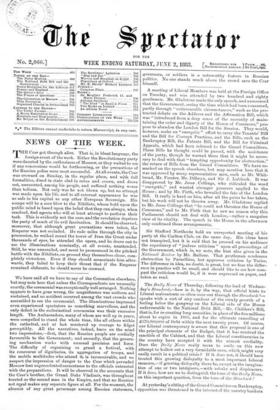We have said all we have to say of the
Coronation elsewhere, but may note here that unless the Correspondents are unusually courtly, the ceremonial was exceptionally well arranged. Nothing appears to have gone wrong, the magnificence was uniform and sustained, and no accident occurred among the vast crowds who assembled to see the ceremonial. The illuminations impressed oven experienced spectators as something marvellous, and the only defect in the ecclesiastical ceremonies was their excessive length. The Ambassadors, many of whom are well up in years, were compelled to stand the whole time, like all others within the cathedral, and at last mustered up courage to fidget perceptibly. All the narratives, indeed, leave on the mind two impressions,—first, that the Russian people are cordially favourable to the Government; and secondly, that the govern- ing mechanism works with unusual precision and force. The difficulty of organising so grand a festival, with its concourse of dignitaries, its aggregation of troops, and the mobile multitudes who attend it, is inconceivable, and we suspect the impression of danger to the Czar which pervaded Moscow lent unprecedented earnestness to the officials entrusted with the preparations. It will be observed in the accounts that the Czar's brother, the Grand Duke Vladimir, was throughout treated as the second man in the Empire, and that no Russian not royal makes any separate figure at all. For the moment, the absence of any great personage among Russian statesmen, governors, or soldiers is a noteworthy feature in Russian politics. No one stands much above the crowd save the Czar himself.


































